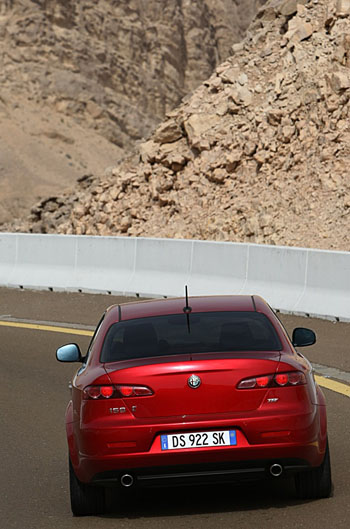 |
|
With the Fiat Group now reportedly just days
away from signing a new Chinese joint
venture agreement with Guangzhou Auto it has
been revealed that the new project will
provide a springboard for Alfa Romeo to
begin manufacturing in China. |
|
|
|
With
the Fiat Group now reportedly just a few days
away from signing a new Chinese joint venture
agreement with Guangzhou Automobile Industry
Group Co., Ltd. it has been revealed that the
new project will also provide a springboard for
Alfa Romeo to begin manufacturing its range of
sporty cars in China.
Chinese media has reported over the weekend that
signing of an agreement could come as early as
Monday, following a process of obtaining
government approval that has been underway for
several months now. Talks between Fiat Group and
Guangzhou Auto have been going on since last
September when the two parties initially opened
discussions centring around the Chinese carmaker
purchasing several redundant Fiat production
lines including those from the failed Nanjing
Fiat joint venture in China as well as two
former Italian lines.
The two
carmakers are targeting production of the joint
venture getting underway as early as 2011 with a
full capacity target of 140,000 automobiles and
220,000 engines a year. This has been confirmed
through a posting on the Ministry of
Environmental Protection website which said that
Fiat and Guangzhou Automobile Industry Group
Co., Ltd. would jointly invest 4.27 billion yuan in the project.
Guangzhou
Automobile Industry Group Co., Ltd. meanwhile
was founded in June 2000 and it is authorised by
Guangzhou Municipal Government to operate
state-owned assets. Benefiting from the
sustainable and fast development of Chinese
automotive industry, in 2007 Guangzhou Auto
realised a sales volume of 510,000 vehicles and
890,000 motorcycles. It already has joint
ventures with Toyota, Honda and Isuzu and has
ambitious plans to launch its own-brand range of
cars.
Last month
Guangzhou struck a deal to merge with Hunan
Changfeng Motor Co. after Guangzhou Auto reached
agreement to take a large equity stake in its
rival, which currently makes a range of SUV
category vehicles. The deal will give Guangzhou
Auto around a 30 percent stake in Changfeng and
would make it clearly the largest shareholder.
It plans to invest 10 billion yuan in Changfeng with the
aim of producing 500,000 cars a year. The first
of these cars will start rolling off the
production lines in 2010. Currently Changfeng has a market capitalisation of 5.78 billion yuan and
includes Mitsubishi Motors Corporation amongst its minority
shareholders. Changfeng's parent company is its the largest
- and controlling shareholder - with a 50.98
percent stake and this will now be reduced to
just under 22 percent. The merger has been
pushed by the Chinese government which is keen
to see consolidation amongst the country's more
than 130 car makers.
The
enlarged Guangzhou Auto will now construct a new
facility that will be used to produce vehicles
for four different brands under one roof. As
well as its own named cars, the plant will
produce vehicles for Changfeng as well as those
for the Fiat Group under both the Fiat and Alfa
Romeo brand names. Whilst Fiat has been exposed
to the Chinese market during this decade through
the now terminated Nanjing Fiat joint venture,
for Alfa Romeo it will be the first time it has
built its cars in China. This new opportunity
comes after recent attempts to create a joint
venture with Chery Automobile were put on ice
after the two parties couldn't reach an
agreement. That proposal clearly illustrated
Fiat Group's lack of understanding of the
Chinese market as the first model planned for
the stillborn joint venture was to be the Alfa
159 sedan, but fitted with a mediocre
Chery-sourced 1.6-litre petrol engine. Now the
Guangzhou Auto deal offers Alfa Romeo a second
chance at cracking the Chinese market where
demand for its category of upmarket sporty cars
is growing swiftly.
|